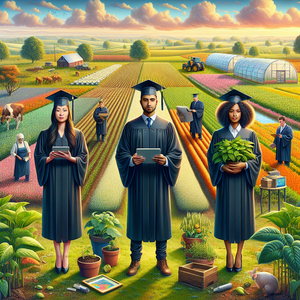
Exploring Careers in Agriculture: A Comprehensive Guide to Opportunities and Responsibilities for Degree Holders
The agriculture sector continues to flourish, evolving with the times and presenting a wealth of career opportunities for individuals armed with agricultural degrees. As the world increasingly emphasizes sustainable practices, agribusiness, and environmental stewardship, a variety of roles emerge—ranging from hands-on positions to those demanding advanced scientific expertise. In this guide, we will explore 20 distinct career paths within agriculture, detailing their responsibilities, necessary qualifications, and the vital contributions these roles make to the industry. Moreover, we will examine current trends, including job growth statistics and the pressing need for sustainability, to provide a well-rounded picture of what aspiring agriculture professionals can expect in their careers.
Job Summaries:
Veterinary Technician:
- Essential to livestock health
- Assist veterinarians in examinations
- Administer vaccinations
- Conduct lab tests
- Educate farmers about animal care
- A degree in veterinary technology is generally required
- This role is pivotal in promoting sustainable livestock practices.
Park Ranger:
- Park rangers play a crucial role in conserving agricultural land and managing natural resources within parks and wildlife areas.
- Their duties include monitoring wildlife, conducting educational programs, and enforcing regulations.
- A bachelor's degree in environmental science is often necessary, emphasizing the importance of conservation in agriculture.
Agricultural Technician:
- Supporting agricultural scientists in research
- Agricultural technicians maintain lab equipment
- Collect samples for studies related to crop and animal production
- Typically requiring an associate degree in agricultural science
- This role is vital for advancing agricultural innovation and sustainability.
Ecologist:
- Ecologists analyze ecosystems and assess the impact of agricultural practices on biodiversity.
- They conduct field studies and devise conservation strategies.
- Usually requiring a master's degree in ecology or environmental science.
- Their research is key to integrating environmental sustainability into agricultural methods.
Crop Manager:
- Crop managers oversee the cultivation of various crops.
- They plan, plant, and harvest crops.
- They analyze soil conditions.
- They devise pest control methods.
- A bachelor's degree in agricultural science or agronomy is typically needed.
- They play a critical role in maximizing crop yields sustainably.
Agricultural Consultant:
- Providing expert advice to farmers
- Agricultural consultants assess operations
- Develop tailored strategies to enhance productivity
- A bachelor's degree in agricultural economics is usually required
- Insights are invaluable for implementing sustainable farming practices.
Farm Manager:
- Responsible for daily farm operations
- Handle staff
- Manage finances
- Oversee crop production
- Ensure compliance with regulations
- A degree in agriculture or business management is generally essential
- Practical experience is important for this leadership position
Soil Scientist:
- Soil scientists analyze soil properties and advise farmers on effective soil management practices.
- A degree in soil science or agronomy is typically necessary.
- This role is crucial for promoting soil health and enhancing agricultural productivity.
Plant Breeder/Geneticist:
- Focused on developing new plant varieties
- Conduct research and field trials
- Usually requiring a master's or doctoral degree in plant science
- Vital for improving crop yields and sustainability
- Utilize advanced genetic techniques
Agricultural Engineer:
- Agricultural engineers design and improve farming machinery and structures, emphasizing efficiency and sustainability.
- A degree in agricultural engineering is required.
- Their innovations help modernize agricultural practices.
Aquaculturist:
- Aquaculturists manage the breeding and harvesting of aquatic organisms.
- Ensuring sustainable practices while monitoring water quality.
- A degree in aquaculture or marine biology is typically necessary.
- This role is essential for maintaining food security.
Sustainable Agriculture Specialist:
- These specialists advocate for practices that protect the environment while ensuring farmers' economic viability.
- They conduct workshops and create resources.
- Usually requiring a degree in environmental science or agriculture.
- Highlighting the importance of education in sustainable farming.
Food Scientist:
- Focusing on food processing, preservation, and safety.
- Food scientists work to improve food quality and safety standards.
- A degree in food science is required.
- Their contributions are integral to public health and marketability.
Agricultural Economist:
- Analyzing economic trends that affect agriculture
- Agricultural economists provide essential insights to stakeholders
- A master's or doctoral degree in agricultural economics is typically needed
- This role is crucial for informed decision-making in the agricultural landscape.
Food Safety Inspector:
- Ensuring food products meet safety regulations.
- Food safety inspectors must possess knowledge in food science or agricultural science.
- This position is vital for protecting public health.
- Ensuring compliance with safety standards.
Forester:
- Foresters manage forested lands for both economic and conservation benefits.
- They develop management plans and conduct surveys.
- A degree in forestry is generally required.
- Their work supports sustainable resource management.
Urban Farmer:
- Urban farmers cultivate crops in city environments
- Focusing on sustainability and local food production
- A background in agriculture or horticulture is beneficial
- Making this role increasingly important for local food security
Rural Practice Surveyor:
- Assessing land and property in rural settings
- Rural practice surveyors offer land use advice
- A degree in surveying or land management is typically necessary
- Aligning with sustainable agricultural development practices.
Greenhouse Manager:
- Responsible for overseeing plant cultivation in controlled environments
- Greenhouse managers usually require a degree in horticulture
- This role is essential for producing high-quality crops
- Particularly in urban agriculture
Livestock Nutritionist:
- Livestock nutritionists develop feeding programs for farm animals.
- They necessitate a degree in animal science.
- Their expertise directly impacts livestock health.
- Their expertise directly impacts agricultural efficiency.
The diverse career paths highlighted here not only illustrate the range of roles available in agriculture but also emphasize sustainability and innovation's significance in modern agricultural practices. For those considering a career in this field, exploring current job openings can help identify the ideal path. With ongoing trends favoring sustainability and technological advancements, the future of agriculture promises exciting opportunities for growth and impact.
Explore More Jobs
